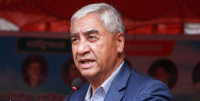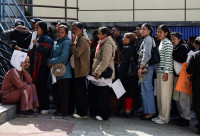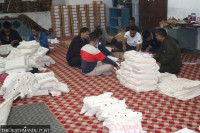National
Social Welfare Council says NGOs not affiliated to it may be vulnerable to money laundering risks
Council suggests freezing by commercial banks of those NGO accounts that are receiving foreign funds, but without the Council’s knowledge.
Prithvi Man Shrestha
The Social Welfare Council has pointed out a number of vulnerabilities in the domestic and international non-governmental organisations that receive funds from abroad and which don’t come to the council’s notice.
In its written suggestions to the Money Laundering, Risk Evaluation Sub-Committee headed by a Home Ministry’s joint secretary, the council has said the risks come from banks opening the accounts of domestic and international non-governmental organisations without the approval of the council.
“The transfer of foreign funds meant for an NGO in the name of individuals through the money transfer agencies is another risk,” the council stated in a suggestion that the Post obtained from the Home Ministry.
The council said that it is difficult for it to track such funds if they come in the name of individuals instead of the institution. It suggested that the central bank take necessary steps to control such practices.
Ram Raj Bhattarai, deputy director at the council, said that there is a trend of sending funds in the name of individuals, although it is not a dominating trend.
“NGOs and INGOs opening many bank accounts without approval of the council have helped them remain outside the scrutiny of the council. So, there is the risk of money laundering,” said Bhattarai.
To control such activities, the council has suggested that the commercial banks need to freeze the accounts of such NGOs which are receiving foreign funds without the council’s knowledge.
“The information about freezing should be shared with Nepal Rastra Bank and the council,” the suggestion reads.
As per the Social Welfare Act, the council is the regulatory body of domestic and international non-governmental organisations in the country. But, just over one-half of the total domestic NGOs are affiliated to it.
According to the council, commercial banks have been releasing donated funds from abroad to NGOs which are not affiliated to the council.
“Such transactions do not get noticed by the radar of the council,” said Bhattarai.
According to the 56th Annual Report of the Office of the Auditor-General, a total of 48,273 NGOs were affiliated with the council as of the fiscal year 2017-19, while the total number of registered NGOs was 106,092.
According to the council, more than 50,000 NGOs have now been affiliated to the council as of the last fiscal year.
On the request of the council, the Home Ministry in August last year had instructed district administration offices to seek the council’s recommendation to renew the registration of NGOs.
The council has said that it has received complaints that some NGOs and INGOs conducted religious activities, going against the project agreement signed with the council.
“The local administrations and local governments should increase their vigil over such activities,” the council suggested.
The council has also stressed on greater monitoring of funds meant to be spent on children’s homes, Madrasas and monasteries. According to the council, many Madrasas and monasteries receive foreign funds for their upkeep and expansion and the education of students.
According to Rajendra Kumar Poudel, member secretary of the council, various foreign individuals and institutions have been sending money in the name of monasteries and Madrasas, but vetting of those who send money is not strong enough.
“We seek authentic documents from such donors, but we are not fully sure about their activities abroad,” he said.
The council wants to ensure that the Madrasas and monasteries’ foreign donors are genuine and registered entities.
The council also takes written commitments from NGOs, stating that foreign funds they receive are in compliance with the country’s anti-money laundering law.
In the case of the INGOs, the council has made it mandatory for them to furnish recommendation letters from the concerned foreign embassy in support of the project agreement.




 22.17°C Kathmandu
22.17°C Kathmandu














